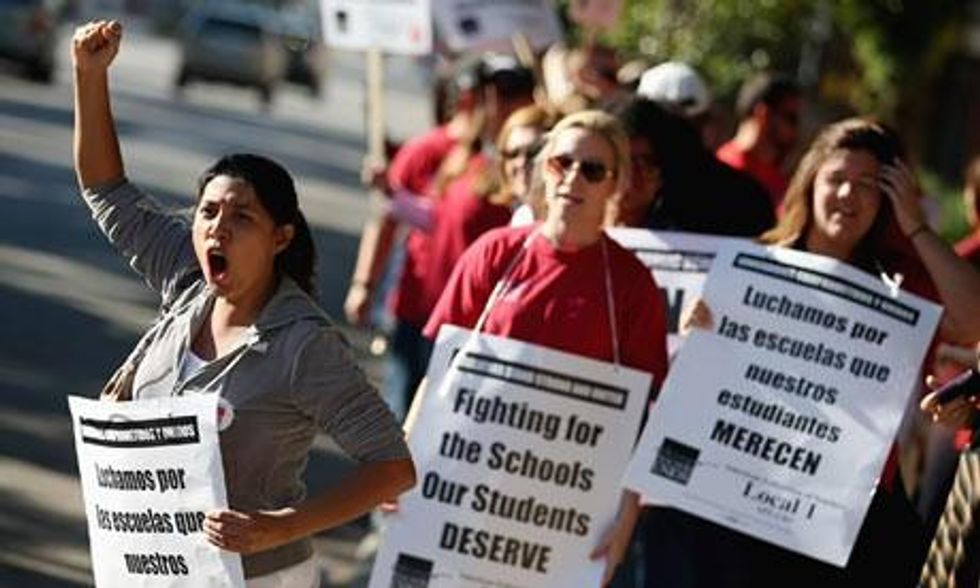The Chicago teachers' strike is barely a day old, and the teacher-bashing is already well underway with great gusto.
As you may have heard, these teachers are greedy, lazy bullies who are holding kids hostage in their mad lust for power. Their choice of profession is not at all motivated by an interest in child betterment, but entirely by the obscenely lavish salaries they receive - some even approaching those of skilled jobs that actually contribute to the public good, like sales managers and insurance underwriters. All this at - never forget - taxpayers' expense. Even liberal bloggers warn that this strike will leave children forever scarred and ruin their future earnings, or at least their test scores.
Teachers might respond that they're not striking over money: both the teachers' union and the school board acknowledge the two sides are close to agreement on wages. They might point out that their demands that are the real sticking points - smaller class sizes and air-conditioned classrooms - are entirely reasonable things most parents also want for their kids. Or they might point out that Mayor Rahm Emanuel's key demand to tie teacher evaluations to student test performance reflects a bureaucratic zeal to replace more and more of the curriculum with standardized tests (one Chicago teacher says 18 to 25 days of the school year are already lost to testing) - an ethos and aim that many parents, and certainly most students, do not share.
They could say all of this, but it wouldn't matter. Any union negotiator or human resources manager can tell you that contracts are never settled by who has the best argument. Bargaining is a question of clout, and which side has more of it. Unions have been losing ground for years, public sector unions in particular, and no unionized profession has been more vilified - by politicians, thinktanks and two Hollywood movies so far - than teachers.
Looking back, this is remarkable. There was a time when teachers were lauded as local heroes: overworked, underpaid pillars of the community who could - with their credentials - earn more elsewhere, but chose to pursue a career sharing the joys of learning with kids. Politically, they were untouchable, up there with cops and firefighters. Endorsements by their unions were prized by politicians hoping to run as "the education candidate".
Then, at a certain point, teachers' unions woke up to find their favorability rating hovering somewhere between al-Qaida's and herpes. This didn't happen overnight, but a confluence of state budget crises, urban blight and suburban flight, a well-funded school reform movement and private charter school industry created the need for a scapegoat for bad public schools. Could it be their financing structure, dependent locally on grossly unequal property tax revenues? Or their unaccountable school boards, such as the one appointed by Rahm Emanuel? Might poverty and unemployment not be to blame? The drug economy? Poor parenting?
No, none of the above. It's teachers and their pesky insistence that they know how best to educate kids simply because they spend most of the day with them.
Teachers' unions were slow to realize their scapegating and its (for them) dangerous consequences. They were slow to defend against some of the more salacious - but fact-challenged - charges against them. And they have not responded effectively by articulating why teachers should have pensions, job security and collective bargaining rights when other workers were either losing theirs or never had them in the first place.
These failures opened the way for New Jersey Governor Chris Christie to make trashing teachers the centerpiece of his political career, in turn setting the stage for Scott Walker in Wisconsin and others. Hard as it is to imagine candidates running for office on a "screw the troops" platform, this is essentially the climate teachers find themselves in today.
Unfortunately for the Chicago teachers, they are unlikely to see a change in the political weather any time soon. Their union is betting, in no small part, that the embarrassment the strike will cause the Democrats in an election year will push Obama to pressure Emanuel to fix a settlement. Signs point to no such outcome. President Obama sees this as a lose-lose situation - he'll be seen either as betraying his labor allies or as caving to special interests - and has explicitly stated his intention to remain uninvolved.
Instead, the strike presents less conflict-averse Democrats like Emanuel the opportunity to posture and show off his business-friendly bona fides for Independents and Republicans (Paul Ryan has already given him words of encouragement). And nothing has more bipartisan support than blaming teachers for problems mayors and congressional representatives can't solve.


